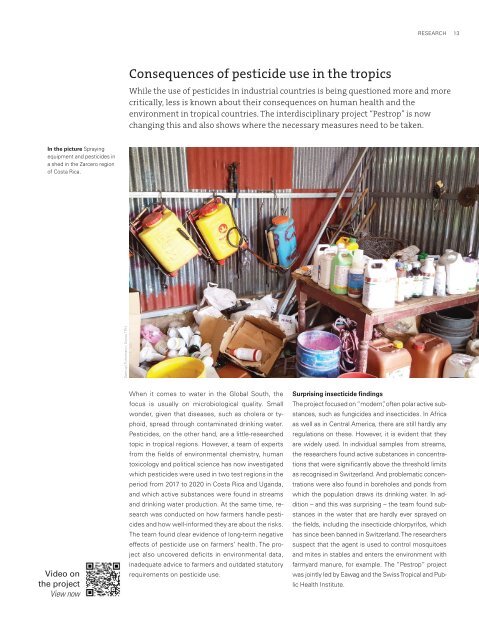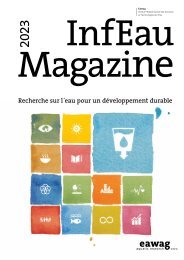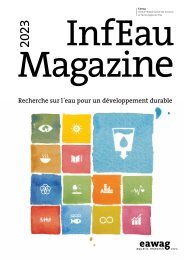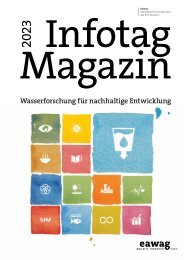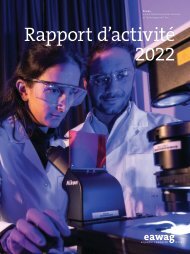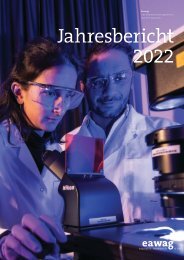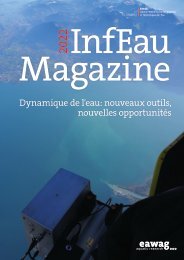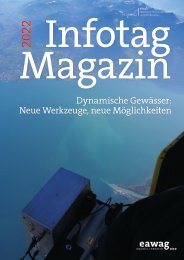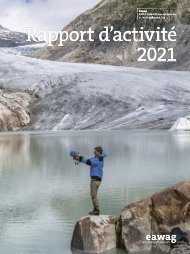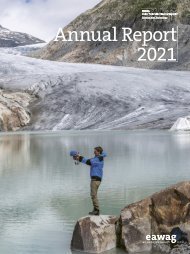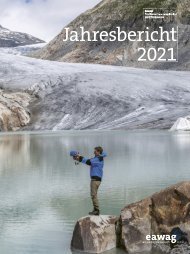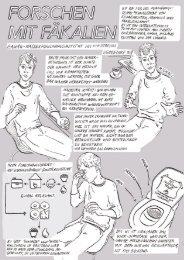Eawag Annual Report 2022
As the aquatic research institute of the ETH Domain, our research is in service of society. You can see this for yourself in our Annual Report. The annual compact review highlights the most relevant research results of the past year and shows how they were developed.
As the aquatic research institute of the ETH Domain, our research is in service of society. You can see this for yourself in our Annual Report. The annual compact review highlights the most relevant research results of the past year and shows how they were developed.
Create successful ePaper yourself
Turn your PDF publications into a flip-book with our unique Google optimized e-Paper software.
RESEARCH<br />
13<br />
Consequences of pesticide use in the tropics<br />
While the use of pesticides in industrial countries is being questioned more and more<br />
critically, less is known about their consequences on human health and the<br />
environment in tropical countries. The interdisciplinary project “Pestrop” is now<br />
changing this and also shows where the necessary measures need to be taken.<br />
In the picture Spraying<br />
equipment and pesticides in<br />
a shed in the Zarcero region<br />
of Costa Rica.<br />
Samuel Fuhrimann, Swiss TPH<br />
Video on<br />
the project<br />
View now<br />
When it comes to water in the Global South, the<br />
focus is usually on microbiological quality. Small<br />
wonder, given that diseases, such as cholera or typhoid,<br />
spread through contaminated drinking water.<br />
Pesticides, on the other hand, are a little-researched<br />
topic in tropical regions. However, a team of experts<br />
from the fields of environmental chemistry, human<br />
toxicology and political science has now investigated<br />
which pesticides were used in two test regions in the<br />
period from 2017 to 2020 in Costa Rica and Uganda,<br />
and which active substances were found in streams<br />
and drinking water production. At the same time, research<br />
was conducted on how farmers handle pesticides<br />
and how well-informed they are about the risks.<br />
The team found clear evidence of long-term negative<br />
effects of pesticide use on farmers’ health. The project<br />
also uncovered deficits in environmental data,<br />
inadequate advice to farmers and outdated statutory<br />
requirements on pesticide use.<br />
Surprising insecticide findings<br />
The project focused on “modern”, often polar active substances,<br />
such as fungicides and insecticides. In A frica<br />
as well as in Central America, there are still hardly any<br />
regulations on these. However, it is evident that they<br />
are widely used. In individual samples from streams,<br />
the researchers found active substances in concentrations<br />
that were significantly above the threshold limits<br />
as recognised in Switzerland. And problematic concentrations<br />
were also found in boreholes and ponds from<br />
which the population draws its drinking water. In addition<br />
– and this was surprising – the team found substances<br />
in the water that are hardly ever sprayed on<br />
the fields, including the insecticide chlorpyrifos, which<br />
has since been banned in Switzerland. The researchers<br />
sus pect that the agent is used to control mosquitoes<br />
and mites in stables and enters the environment with<br />
farm yard manure, for example. The “Pestrop” project<br />
was jointly led by <strong>Eawag</strong> and the Swiss Tropical and Public<br />
Health Institute.


